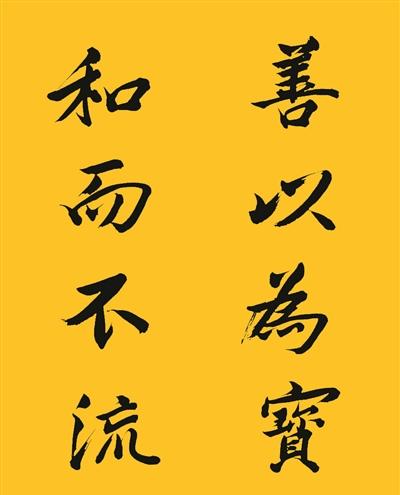Tea addiction is enough, twist the lamp. Patrol the bookshelves, like a gossip Tanaka to see cauliflower, find a few books related to Qu people, receive the taste, appreciate the rhyme, and dissipate the floating life for half a day. I am always used to such nights, open the books, feel the sharpness and warmth of the years. - Caption
Quzhou Jiangshan Qingyang ancient village built "Mao Zishui Former Residence", the collection of Mao Zishui works, is the Taiwan edition and each only one, is a cultural relics, want to lend out to read, equivalent to ascending to the heavens. Therefore, if my generation wanted to understand Maozishui, the only two books on the market could be found: "< Analects> "Translation of the Present Commentary" and "Maozi Hydrological Preservation".
The "< Analects > The Present Commentary and Translation" is one of the most authoritative interpretations of the Analects on both sides of the Taiwan Strait so far. According to Mao Zishui, he spent his life reading "one and a half" books—a "Geometric Origin" and half of the Analects.
"Maozi Hydrological Cun" includes some of the manuscripts published by Mao Zishui before his death, including more than 40 articles such as "On the Sons", "Russell and Modern Culture", and "Hu Shi Biography".

Mr. Mao Zishui's handwriting.
Mao Zishui does not seem to have a great achievement in his life, but he has become a cultural master who can influence the reader's life with his noble personality and profound knowledge. Some people have summed it up like this: Among those who study science, Maozishui has the best foundation in Sinology; among those who study Sinology, Maozishui has the deepest foundation. Therefore, Mao Zishui is respected by the academic circles in Taiwan as a "Tongren" and "Tongru".
During the May Fourth period, two magazines of Peking University became the banner of the new culture. One is the prestigious "New Youth", and the other is the up-and-coming "New Wave". "New Wave" was first published in January 1919 and was published in three volumes and two issues, with a total of 12 issues.
In the winter of 1918, Mao Zishui and his classmates Fu Sinian and Luo Jialun initiated the organization "New Wave Society" and founded the "New Wave" journal, which was titled Cai Yuanpei. In the process of founding, he received support and help from Li Dazhao, Chen Duxiu, Lu Xun and others. The journal echoed the "New Youth", held up the banner of ethical revolution and literary revolution, advocated the liberation of individuality, and lashed out at the despotic following, showing a distinct battle against feudal morality and feudal literature. Cultural celebrities in modern Chinese history, such as Gu Jiegang, Sun Fuyuan, Ye Shengtao, Yu Pingbo, Zhu Ziqing, and Feng Youlan, are all members of the New Wave Society.
The list of members announced in the first issue of "New Wave" is in the order of strokes, the first place is Mao Zishui, a Jiangshan person, and others include Yu Pingbo, Kang Baiqing, Fu Sinian, Luo Jialun, Gu Jiegang and others, and Houye Shengtao, Zhu Ziqing, Guo Shaoyu, Feng Youlan, and Zhou Zuoren have joined successively. Mao Zishui was an active figure in it, and later became one of the five members of the editorial board.
In cultural history, Hu Shi's advocacy of "sorting out the national past" has a far-reaching impact, but it was Mao Zishui who first proposed the concept of "national history". In the fifth issue of the first volume of "New Wave", Mao Zishui published "The Spirit of National History and Science". But history always likes to joke, Mao Zishui criticized the national heritage, and later he liked the country's origin, indulging in it and not extricating himself.
As one of the "Three Musketeers" under Hu Shi 's men (the other two being Fu Sinian and Gu Jiegang), Mao Zishui and Hu Shi knew each other throughout their lives, and Mao Zun called Hu a mentor and carried out the rituals of the most important; Hu praised Mao as the "Southeast Library" and praised them. Think about it, the world-famous Hu Shi can actually write the four words "Qingyang Ancestral House" for the Mao Clan Ancestral Hall in Quzhou Jiangshan, which shows how deep the teacher-student friendship between Hu Shi and Mao Zishui is.
Around the autumn of 1922, Peking University opened a history department, and it was urgent to train professors of history and geography, so it was decided to select two graduates from Peking University to study in Germany at public expense. Mao Zishui and Yao Congwu Kaozhong, Maozi Water Geography, Yao Congwu Mongolian History and Historical Methods. In the winter of that year, Mao Zishui and Yao Congwu went to Germany to study together. Mao Zishui once said: "When I studied in Germany, Einstein was teaching scientific principles at the University of Berlin, and I rushed to audit two or three times, and his class was indeed wonderful, his words were shallower than books, and students were easy to accept." He is a genius who can speak well and dance and ink. In addition, Mao Zishui also listened to lectures by Einstein's teachers Panke and Pulang Crowe at the University of Berlin.
To be able to listen to Einstein's lectures is simply "blissful." But even during his stay in Germany, Mao Zishui still loved the old bookstore. And I can write a little article about Mao Zishui, and some of the historical materials come from the "New Wave" magazine found in Wang Hanlong's old bookstore.
(Original title: "[The Sharpness and Warmth of the Years] There are actually Quzhou people who have listened to Einstein's lessons", the original author Wu Shaofei. Edited by Xu Wenjian Mei Lingling)